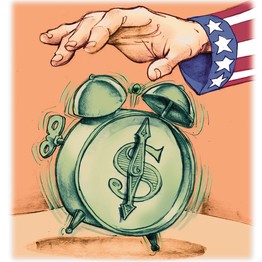How to Get America Moving Again
< < Go Back
by George P. Schultz,
The world is in turmoil and needs a stronger U.S. It’s time to wake the sleeping giant by taking these specific steps to rev up the economy.
Adm. Isoroku Yamamoto, who led the Japanese fleet at Pearl Harbor, had spent some time before World War II in the United States. After the attack, he allegedly said, with a sense of foreboding, “I fear all we have done is to awaken a sleeping giant and fill him with a terrible resolve.” Well, the giant is sleeping again. What does it take to wake us up? How many times can we be kicked in the belly before we take notice?
The world is awash in change that affects us and our allies. We must recognize this and strengthen our military capabilities, set effective strategies, and be prepared to support our principles and oppose those who seek to destroy them. To do so, we must get our economy really rolling again. How? Everyone knows how. We just need to take action:
(1) Cleanse the personal income tax system of deductions and lower the marginal rate on a revenue-neutral basis. The template is right there in the 1986 Tax Act, which passed the U.S. Senate 97-3.
(2) We all know that corporate taxation is an anachronism. Why do we want a system that encourages American companies to reincorporate abroad? Let the earnings they make in other countries be taxed there, and that’s it. Why give incentives for companies to keep their cash offshore rather than invest it in the U.S.? And let’s lower the corporate tax rate to be competitive with the rest of the world. How about 20%?
(3) We all know that the maze and uncertainty of the regulatory octopus is stifling the economy. Regulations are needed, but they can be made simpler and designed to work better.
(4) While we are reducing uncertainty, why not take the mystery out of the Federal Reserve? The Fed can establish a rules-based monetary policy with the ability to deviate from the rules as long as they publicly explain why, using cost benefit thinking in the explanation.
(5) Get control of spending. Otherwise the burden of servicing government debt when normal interest rates return—a burden that already amounts to hundreds of billions annually—will be unbearable. The problem is entitlement spending.
(6) Health-care finance is more difficult, but here is a simple formula to use as a basis for further work.
The main risks in the health-care area are catastrophic events that have high costs, so high-deductible catastrophic insurance is what is needed.
Let’s encourage health-savings accounts. Singapore has required health savings accounts and price transparency since 1984, and even the poor who get government support are motivated to spend carefully.
Most people who make a decent living can afford to put pretax income into health-savings accounts, which they can then use to pay for routine medical services. We also should tweak Medicare and Medicaid so that significant health-savings accounts can be created for their recipients—so most everyone can have access to the health care system.
What about our defense and foreign policy? Let’s put our military to work figuring out what we really need. We want no-nonsense people in charge. We want to do away with all nonsensical across-the-board sequester rules. But we must have a robust military capability. And then we need to conduct ourselves in a credible way.
America needs to work closely with its friends and allies. There are many of them. They need leadership and example. The problems ahead are too numerous to enumerate, but the threats to us and our friends are real. So, wake up, sleeping giant! You have work to do.
More From The Wall Street Journal (subscription required):




